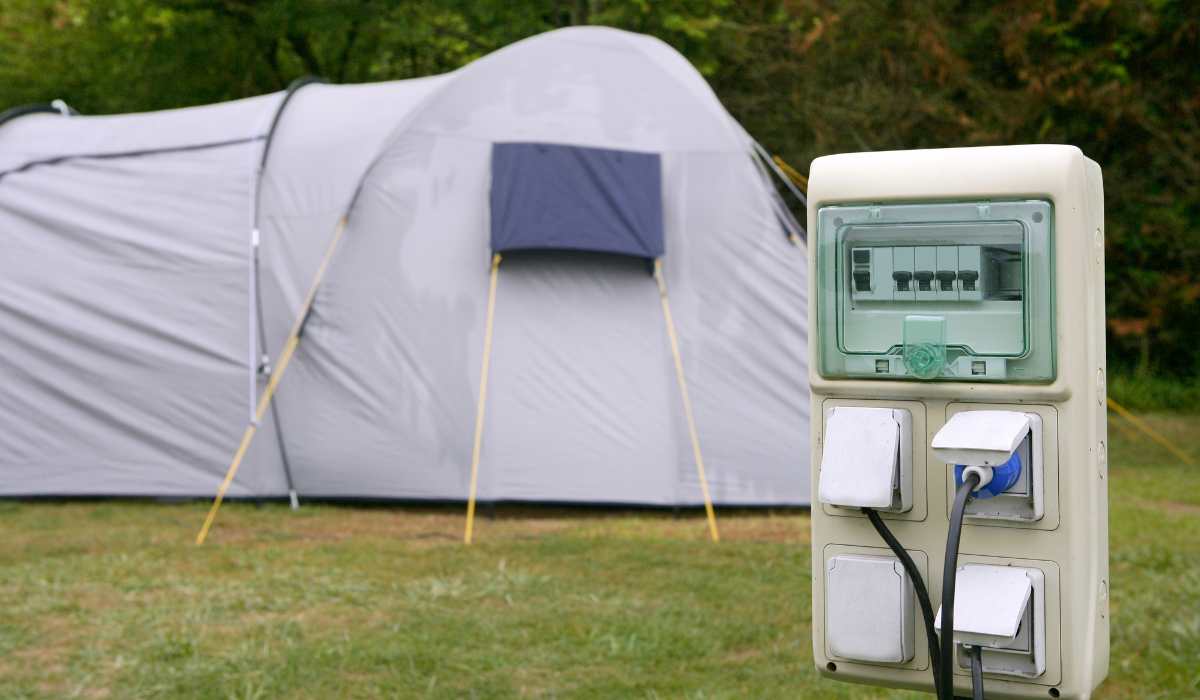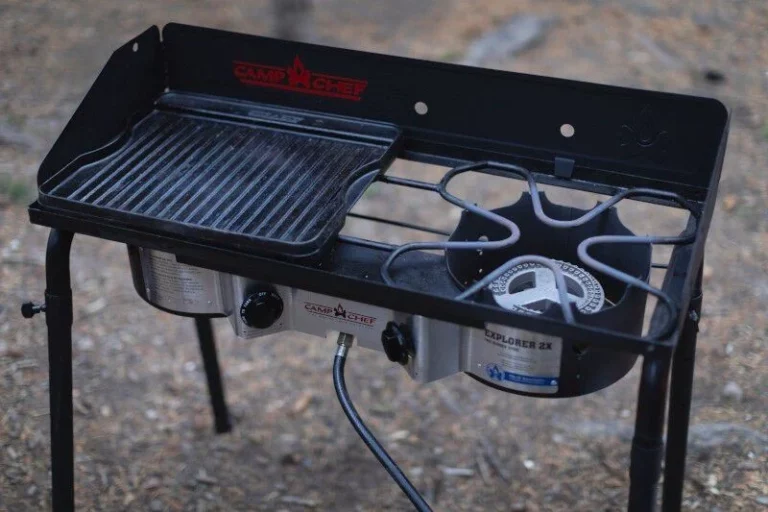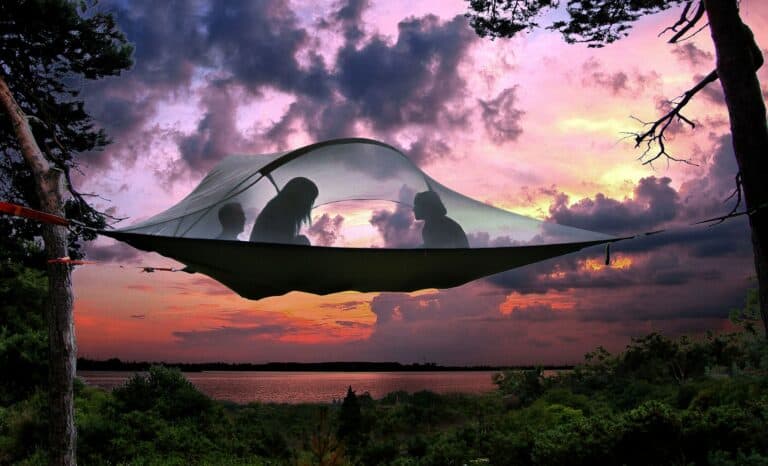Tent Camping with Electricity: Enhancing Your Adventure
Tent camping with electricity offers a unique blend of the traditional outdoor experience and modern convenience. As more campers seek ways to maintain access to essential electronics, it’s important to explore various options for powering your tent camp during your next adventure.
In this comprehensive guide, we will delve into electric campsite options such as privately-owned campgrounds, state and national park choices, and RV parks with designated tent areas. For those seeking free alternatives, we’ll discuss U.S Forest Service-managed sites and BLM lands suitable for tent camping with electricity.
Additionally, you’ll learn about portable power solutions like solar generators for off-grid power supply and gas-powered alternatives. We’ll also cover crucial safety precautions when using electricity while camping – from proper extension cord usage to investing in surge protectors and GFCI outlets.
Lastly, we will examine high-amperage appliance considerations along with ventilation requirements for generators. If you’re looking to use the solar energy while camping, we can provide information on charge controllers, inverters and deep-cycle battery storage systems.
Table of Contents
1. Electric Campsite Options

For those looking to combine the convenience of electricity with tent camping, there are many campgrounds offering power and other amenities such as showers and running water. These sites offer not only access to power but also amenities like showers and running water. In this section, we’ll explore some popular options for electric campsites.
Privately-owned Campgrounds
KOA campgrounds, Yogi Bear’s Jellystone Parka„¢ Camp-Resorts, and other privately-owned establishments often provide tent camping with electrical hookups. Private campgrounds typically offer amenities like restrooms, showers, laundry rooms and even swimming pools or playgrounds for families. To find private campgrounds near your destination offering electricity for tents, use online resources such as FreeRoam, Campendium, or The Dyrt.
State and National Park Options
- State Parks: Many state parks across the US offer standard campgrounds with electrical hookups for RVs and tents alike. Check out each park’s website or contact their visitor center to confirm availability before heading out on your camping adventure.
- National Parks: Some national parks also provide tent campsites with access to electricity; however, these may be more limited than those found in state parks due to preservation efforts within protected lands.
RV Parks Offering Tent Sites
In addition to dedicated tent campgrounds, many RV parks also offer spaces specifically for tents with access to electrical outlets. These sites often come with the added benefit of being located near other amenities like showers and laundry facilities. Remember to be conscious of energy consumption when staying at an RV park, as it may be higher than other camping grounds.
No matter which type of electric campsite you choose, remember always to follow safety guidelines when using electricity during your stay. In the next section, we’ll discuss alternative power sources for remote camping trips without access to campground-provided electricity.
Click here to read about Discover the Best Tall Tents for Ultimate Camping Comfort
2. Alternative Power Sources for Remote Camping
When staying at a non-electric site on BLM lands or other remote locations without power sources provided by the campground management team, you will need alternative means of generating electricity. Thankfully, there are several options available to ensure that your camping experience remains comfortable and enjoyable.
Solar Generators
A popular choice among eco-conscious campers is solar generators. These devices harness the sun’s energy to provide clean and renewable power for your camping trip. One such option is the EcoFlow DELTA Portable Power Station, which offers multiple AC plugins, USB ports, and an intuitive design. Other notable solar generators include the Anker 737 Explorer 240 and the Bluetti generator.
Gas-Powered Generators
If you’re planning longer camping trips or require more substantial energy consumption than what solar panels can provide, gas-powered generators may be a better fit for your needs. The WEN 56380i is one such reliable option with its quiet operation and fuel efficiency features; however, remember that these types of generators emit fumes requiring proper ventilation when in use outdoors near tents (Note: Never use a gas generator inside your tent). For further advice on choosing a gas-powered generator for camping, refer to this detailed guide.
Battery Storage Solutions
Another alternative power source to consider is battery storage solutions. These portable power stations store energy that can be used when you’re camping without access to electricity. Some popular options include the Goal Zero Yeti 500X Portable Power Station, which boasts an impressive array of output ports and charging capabilities, as well as the compact and lightweight Jackery Explorer 240. To maximize their efficiency during longer camping trips, pair these battery storage solutions with solar panels or other compatible charging methods.
By exploring these alternative power sources for remote tent camping, you’ll ensure that your next camping experience remains enjoyable while maintaining a comfortable level of access to electricity.
Key Thought:
When camping in remote locations without power sources, there are alternative means of generating electricity such as solar generators, gas-powered generators and battery storage solutions. These options provide clean and renewable power for longer camping trips or when more substantial energy consumption is required. It’s important to remember that gas generators emit fumes requiring proper ventilation when used outdoors near tents.
3. Safety Precautions when Using Electricity in Tent Camping

When it comes to tent camping with electricity, safety should always be a top priority. Ensuring you follow some simple precautions can help prevent accidents and make your camping experience more enjoyable. In this section, we’ll discuss proper extension cord usage, the importance of surge protectors and GFCI outlets, as well as weather considerations for using electrical equipment at your campsite.
Proper Extension Cord Usage
Using undamaged extension cords is crucial to maintaining a safe environment while accessing electricity during your camping trip. Inspect each cord before use to ensure there are no frayed wires or damaged insulation that could pose a risk. Additionally, avoid laying cords where puddles could form or across high-traffic areas in order to minimize the chance of water damage or tripping hazards.
Surge Protectors and GFCI Outlets
Incorporating surge protectors into your setup can help prevent overloading power sources and damaging electronic devices connected to them. Look for surge protectors with built-in Ground Fault Circuit Interrupter (GFCI) outlets which offer an added layer of protection by automatically shutting off power if they detect any imbalances in energy consumption.
Weather Considerations
- Rain: When setting up electrical equipment at your campsite, it’s important to consider the potential for rain. Use weather-resistant extension cords and surge protectors designed for outdoor use to minimize risks associated with wet conditions.
- Wind: Wind can also pose a threat by blowing debris onto your electrical setup or causing cords to become tangled. Secure all cables and equipment as best as possible, using stakes or weights if necessary.
- Temperature: Extreme temperatures can affect the performance of electronic devices and potentially cause damage. Be mindful of any temperature-sensitive items you’re camping with, such as laptops or smartphones, and take steps to keep them cool in hot weather or warm in cold conditions.
Taking these safety precautions into account will help ensure that your tent camping experience is both enjoyable and secure while utilizing electricity at your campsite. Remember always to prioritize safety when dealing with electrical equipment outdoors.
Key Thought:
To ensure safety when tent camping with electricity, it is important to us undamaged extension cords and weather-resistant equipment. Incorporating surge protectors with GFCI outlets can prevent overloading power sources and automatically shut off power if imbalances are detected. Consider potential weather conditions such as rain, wind, and extreme temperatures that may affect the performance of electronic devices.
Click here to read about Discover the Best Big Tents for Camping
4. Accommodating High Amperage Appliances during Tent Camping
If you’re planning to incorporate appliances requiring higher amperage, such as 30 or 50Amp hookups, into your camping setup, it’s essential to have the appropriate equipment to accommodate these requirements. In this section, we’ll discuss selecting suitable generators and the proper placement of inverter generators while considering ventilation.
Selecting Appropriate Generators
When choosing a generator for your tent camping trip, consider the power output required by your high-amperage appliances. A reliable option is an inverter generator that provides clean energy with minimal noise pollution. These generators are designed for outdoor use and can handle various devices’ energy consumption needs. Some popular models include the Honda EU2200i and the Yamaha EF2400iSHC.
Proper Placement of Inverter Generators
In addition to selecting an appropriate generator for your tent campsite, proper placement is crucial for safety reasons. Ensure that the generator is placed outside of your tent at a safe distance from any flammable materials like sleeping bags or cooking gear. To prevent tripping hazards and reduce electrical risks further, make sure all cords are secured neatly away from walkways.
Ventilation Considerations
- Adequate airflow: When using gas-powered generators during your camping experience, ensure there is sufficient airflow around the generator to prevent overheating and potential hazards.
- Exhaust direction: Direct the exhaust away from your tent and other campers to minimize exposure to harmful fumes. This consideration is especially crucial in standard campgrounds or RV parks where multiple campsites are close together.
- Elevation: If you’re camping at high altitudes, be aware that generators may not perform as efficiently due to thinner air. Check the manufacturer’s guidelines for altitude adjustments if necessary.
Incorporating high-amperage appliances into your tent camping setup can significantly enhance your overall experience by providing access to electricity for cooking, heating, or entertainment purposes. By selecting an appropriate generator and ensuring proper placement with adequate ventilation, you’ll enjoy a safe and comfortable stay while exploring the great outdoors.
Key Thought:
When tent camping with high-amperage appliances, it’s important to select an appropriate generator such as the Honda EU2200i or Yamaha EF2400iSHC. Proper placement of the generator is also crucial for safety reasons, ensuring that it is outside of the tent and away from flammable materials while cords are secured neatly away from walkways. Adequate ventilation must be considered by directing exhaust fumes away from campers and providing sufficient airflow around the generator to prevent overheating.
Click here to read about Discover the Best 5 Person Tent for Your Outdoor Adventures
5. Solar Panel Solutions for Tent Camping with Electricity

For those who want to enjoy the benefits of electricity while tent camping, solar panels are an eco-friendly and sustainable option. Although they can only produce direct current (DC), there are ways to make them compatible with AC devices. In this section, we will explore how you can set up a solar panel system for your next camping trip.
Deep Cycle Battery Storage
The first component you’ll need is deep-cycle battery storage. These batteries are responsible for storing energy created by the solar panels during the daytime and supplying electricity when there is no sunlight. Choose a high-capacity deep-cycle battery that matches your energy consumption needs during longer camping trips.
Charge Controllers
A charge controller is essential in regulating the flow of electricity between your solar panels and battery storage. It prevents overcharging or discharging, ensuring optimal performance and longevity of both components. Make sure to select a charge controller suitable for your specific solar panel setup.
Inverters for Solar Panel Systems
- Pure Sine Wave Inverter: A pure sine wave inverter converts DC power from your battery into clean AC power similar to what’s provided by standard electrical outlets at home. This type of inverter works well with sensitive electronics like laptops or smartphones without causing any damage due to voltage fluctuations.
- Modified Sine Wave Inverter: Modified sine wave inverters also convert DC power into AC but generate a less stable waveform. They are generally more affordable but may not be suitable for all devices, especially those with sensitive electronics.
When setting up your solar panel system, it’s essential to use high-capacity cables and keep them away from high-power sources to avoid any potential hazards. Also, consider investing in a portable power station as a backup option during cloudy days or extended periods of low sunlight.
Tent camping with electricity doesn’t have to mean relying on gas generators or electrical hookups at standard campgrounds. By including solar panels in your camping equipment, you can take pleasure in the comfort of having electricity while diminishing your environmental impact and supporting sustainable energy sources.
Click here to read about Best Tents for Wind and Rain: Top Picks & Features
FAQs Tent Camping With Electricity
How to Get Electricity While Tent Camping
If you’re planning a camping trip and want to access electricity, there are several options available. You can reserve an electric campsite with power hookups or use portable power solutions like solar generators, gas-powered generators, or deep-cycle battery storage systems. Additionally, investing in solar panels and charge controllers can help generate and manage an off-grid power supply.
Can You Have Electric Hookup in a Tent?
Yes, tents can be connected to an electric hookup if the campsite provides electrical outlets. Use proper extension cords designed for outdoor use and consider surge protectors or GFCI outlets for safety. Be aware of weather conditions when using electricity outdoors to prevent accidents.
What Does It Mean When a Campsite Has Electricity?
A campsite with electricity means that there are electrical outlets available for powering appliances and devices during your stay. These campsites typically offer 110-volt AC connections suitable for most standard equipment but may also provide higher amperage options depending on the location.
Can You Get Power in a Tent?
You can obtain power inside your tent by connecting to an external source such as campground-provided electrical hookups or utilizing portable energy sources like solar panels, generators, or battery storage systems. Ensure all cables are safely routed into the tent without causing trip hazards or compromising weather protection.







